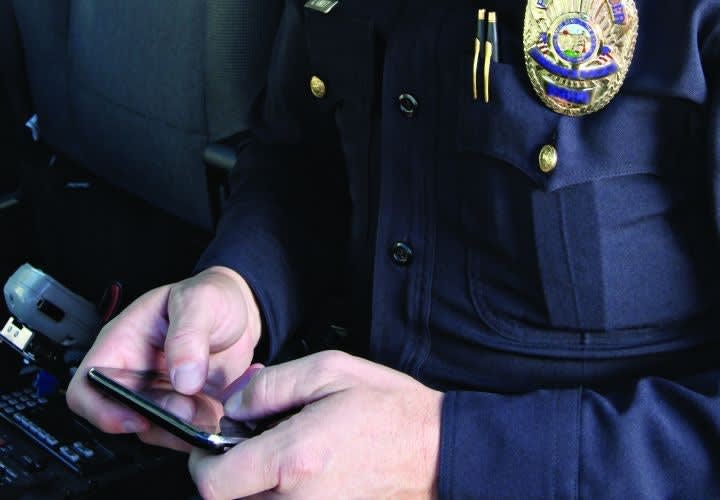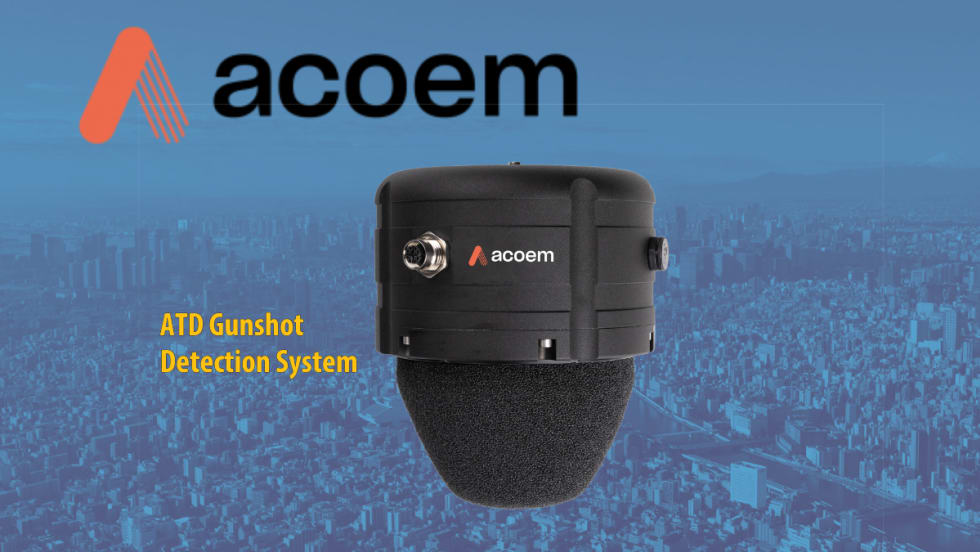The cops who came before you had to rely on plastic-coated reference cards and notebooks stuffed in their shirt pockets, and maybe you do to some degree as well. Still, there's no reason not to take advantage of the amazing and relatively cheap computing power of a smartphone to use while on patrol.
The cops who came before you had to rely on plastic-coated reference cards and notebooks stuffed in their shirt pockets, and maybe you do to some degree as well. Still, there's no reason not to take advantage of the amazing and relatively cheap computing power of a smartphone to use while on patrol.
The line between smartphones and other cell phones is increasingly blurry. It's rare to find a cellular handset that only makes and receives phone calls anymore. Virtually all of them incorporate cameras, can send and receive text messages, and incorporate some multimedia or information storage capabilities. The primary advantage of smartphones is in the ability to install programs or applications ("apps") of your choosing, and not be limited to those that came with the phone.
Which apps are available to you is largely determined by which phone and carrier you choose, and which operating system (OS) you run. The most widely used operating system is one you may not know, called Symbian. Symbian runs exclusively on Nokia phones, and has almost 50 percent of the market share worldwide. The reason you haven't heard much about it is that "worldwide" in this case means "besides the United States." In the U.S., BlackBerry is king, followed by the iPhone, Windows Mobile, Android, and Palm. Of these, Android is the comer, expected to pass iPhone's iOS by 2012.
Fortunately, you don't have to plan that far ahead. Most smartphone users trade out their handsets at least every two years, if not more often. The technology evolves so quickly that the hottest phone on the market today will be passé in two years, and the new app you will want to use won't run on the old one. If you're not already using a smartphone, this is a time to live for the moment. Find one that suits your immediate needs, and don't be too concerned about growing into it.
Messaging and E-Mail
Your world may already run on e-mail and text messaging. To whatever degree it does, you will want a phone that is compatible with the messaging conduits you use. Do you need to access more than one e-mail account (such as your personal and work accounts)? Most phones that are e-mail capable will communicate with personal e-mail services, but many corporate and government e-mail systems use enterprise servers that require special protocols.
This is the reason that BlackBerry rules the business market for smartphones. Research In Motion (RIM), the company that owns BlackBerry, runs its own servers and plays nice with enterprise systems. Most BlackBerrys have hardware keyboards with physical keys, rather than icons on a touchscreen, and are optimized to "push" messages to the handsets without the user having to request them manually. Other smartphone systems will do this, too, but RIM has the most transparent setup for it.
Text or instant messaging (IM) works on most any cell phone, but the hardware vs. software keyboard issue can be a critical feature if you use IM a lot.
Where possible, try using a handset in the store before you make a purchase. A tiny difference in size or the placement of a few keys makes one handset a pleasure to use, where another makes your hands and wrists ache.
Whichever you choose, remember that you're no longer a spectator in the world, and you can't afford to lose situational awareness while you compose an e-mail or IM. Restrict that activity to environments where you're relatively safe, or when someone is watching out for you.
Photography
Smartphone cameras have some serious chops these days, and there's every reason to make use of them. Photos document information in a way words can't, and you never know when something that seemed trivial yesterday will be important today.
When you check out your car at the start of watch and find there's a ding or two in the paint, take a picture. It might save you some grief later. When you notice that homeboy has found an innovative method of lacing up his sneakers, take a picture of it. That could be the only distinctive detail his next robbery victim remembers about him. Photograph new graffiti (so you can tell when it becomes old graffiti later in the day), cars of people you stop, and storefronts of businesses on your beat. You'll learn them faster, and have a record of what is typical for the business, and what isn't.
Most every cop I know who has made it through his career wishes he had more pictures from "back in the day." Take pictures of the people you work with and the things they do. Make sure you record the names of the people in those pictures, because, trust me, the day will come when you won't be able to remember them. There is commercial software to help you index and document your photos, but the free Picasa application from Google works about as well as the others.[PAGEBREAK]
There are add-on photography applications for smartphones that will be useful for you. For the iPhone, there's Camera Plus Pro, which allows you to control some aspects of camera function not available in the native software. This includes delaying the shutter release until the camera is relatively steady and a "burst" mode to take several frames at a time. Android has Camera Pro, with similar features. Another iPhone camera app you might find useful is Camera Camouflage, which has a screen that looks like an incoming call (and will even ring), but actually takes a picture each time you speak into the mic.
Information Management
You're going to be handling a lot of information, some of it pretty random. Good investigators are good note-takers, and record their observations regularly, usually in a pen-and-paper notebook. The downside of this method is that paper notebooks have limited capacity, and aren't searchable. Notes taken on your smartphone are searchable, have infinite capacity if you allow for expansion onto a memory card or "the cloud" (data maintained on the Web or elsewhere where you can retrieve it wirelessly), and can be associated with pictures and other data.
Evernote offers apps for most PC, Mac, and smartphone OSs, and is versatile enough for law enforcement or any other use. When you see something you want to remember or keep track of, send it to Evernote. This applies to photos, text notes, e-mail, Web pages, articles, and just about anything else. Evernote stores a copy on your device and on the Evernote server, where you can retrieve it at your leisure. You create tags and categories to fit your own needs. A free Evernote account allows you 40 MB of uploads per month, which is plenty enough for most people. If you get to be an Evernote junkie, you can get a premium account for $5 per month and upload 500 MB.
Another type of information manager is eWallet, which offers versions for most smartphone platforms, PCs, and Macs. eWallet is for the kind of information you might carry in your wallet: account numbers and passwords, serial numbers, prescriptions, clothing sizes, PINs, etc. It comes with template "cards" for most any kind of information you're likely to need, and there are blank general purpose cards and design-your-own versions.
The database is encrypted on whatever device you have, so if it does fall into the wrong hands, it will be useless without the password. When you make a change on one platform, you can synchronize it to the other, so your mobile and desktop files stay concurrent. Among the files in my eWallet are cards for each one of my guns, with make, model, serial number, and place of purchase. I have similar files for my computers and other electronic gear. If something goes missing, I always have its details.
You can use your smartphone to replace some of the reference books and "cheat sheets" you've collected (or you will create). Droid Law is a free database for Android phones, and is necessary to run any of the various state and federal code references they have for sale. Why carry a book around when you can have the entire criminal and/or vehicle code for your state on your phone? There are similar applications for other smartphone platforms, although you may not find a ready-made solution for your jurisdiction.
If not, consider making your own. Every smartphone platform has one or more flat-file database applications available. It wouldn't take all that many evenings to create your own criminal code database, and populate it by cutting and pasting from the online version of your state's statutes. You might even be able to sell your work to other officers (but check copyright issues before you try).
Foreign Languages
Do you speak all of the languages used by the people in your community? Me neither. Every smartphone OS offers "phrasebook" applications you can use for the occasional encounter, even if the language isn't especially common or frequently encountered in your area. An iPhone app called "Spanish for Police-Audio Phrasebook" goes one step farther by including a sound file of every phrase, so if your Spanish enunciation isn't up to par, the app will say it for you.
It's almost impossible to list all of the apps available for police smartphones, and the ways they can be used. If I tried, it would be outdated by the time this appeared in the magazine. Just know that if there's some task where you want to use your smartphone, there is probably a way to do it and "an app for that."
Smart Cop's Smartphone User Guide:
1. Don't keep or transmit messages or pictures you wouldn't want to see attributed to you in the newspaper. Even if the phone and the airtime are your personal property, these things have a way of coming back to haunt you.
2. You aren't any more skilled at playing with your phone or text messaging while driving than the 17-year-old you ticket for it. Moreover, when you drive into a tree, it's that much more embarrassing.
3. Set your phone so that it requires a password every time you use it. Yes, it's a pain in the butt, but not as much as if Tommy Tweaker gets it and has control of your address book, photos, and whatever else might be on there.
4. Consider getting a phone and a service that allow you to wipe and/or disable the phone remotely if it's stolen or mislaid. It might cost more, but it will be worth it.
Tim Dees is a retired police officer and the former editor of two major law enforcement Websites who writes and consults on technology applications in criminal justice. He can be reached via editor@PoliceMag.com.
Related:












